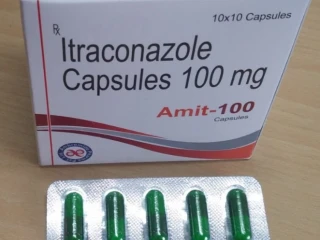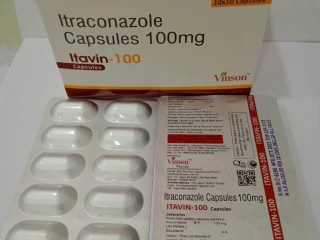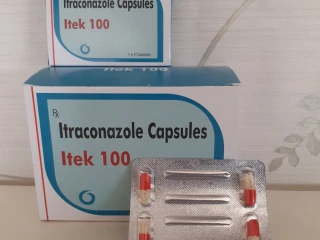Your Requirements?
Itraconazole Capsules in Ropar
- Location: Delhi - 266km
- Address: J Block 3352 DSIIDC Industrial Area,, Narela, Delhi, India, Delhi New Delhi 110040
- Location: Chandigarh - 36km
- Address: SCF-519, 2ND FLOOR, MOTOR MARKET,, MANIMAJRA CHANDIGARH, Chandigarh 160101
- Location: Panchkula - 43km
- Address: 363, FIRST FLOOR , INDUSTRIAL AREA PHASE II, PANCHKULA HARYANA, Panchkula Haryana 134113
- Location: Panchkula - 43km
- Address: 110, Industrial Area Phase 2,, Panchkula, Haryana, Panchkula Haryana 134109
Information About Itraconazole
Itraconazole Uses
The medicine itraconazole is used to treat bacterial and fungal infections. Fungal infections of the mouth or vagina (thrush), skin, and other body parts like finger and toenails are treated with it.
How does Itraconazole work?
Itraconazole is an antifungal medication. By damaging the fungal cell membrane, it kills the fungus and prevents it from growing, healing your skin problem.
Common side effects of Itraconazole?
Headache,Nausea, Abdominal pain
Expert Advice For Itraconazole
-
Fungal infections of the mouth, skin, vagina, or any other region of the body can be treated with itraconazole.
-
Even if you start to feel better, do not miss any doses and see the entire course of treatment through.
-
Eat something when you take it, ideally at the exact same time every day.
-
While using this medicine, use a trustworthy method of contraception to avoid getting pregnant.
-
Within two hours of taking itraconazole, avoid consuming antacids or other stomach medicines.
-
Before beginning therapy and on a regular basis afterward, your doctor might examine your liver function. Notify your physician if you observe any yellowing of the skin or eyes, black urine, or stomach discomfort.
-
Notify your physician if you experience nerve discomfort, allergic reactions, or hearing loss.
Frequently Asked Questions For Itraconazole
Q. What is Itraconazole used for?
Itraconazole is used to treat fungal infections caused by the bacteria Microsporum spp., Epidermophyton floccosum, and Trichophyton spp. Infections in the groin and buttocks, feet, or ringworm infection are possible causes. This medication is also used to treat people with weakened immune systems for persistent infections of the fingernails and toenails, persistent vaginal yeast infections, and persistent oral or throat yeast infections. It is also used to treat infections brought on by histoplasma, aspergillus, and Blastomyces, as well as cryptococcal infections.
Q. For how long do I need to take Itraconazole?
Your reaction to the treatment and the nature and spot of the infection will determine the dosage and duration of the course of treatment. For instance, you would need to take the dosage for 30 days if you are taking itraconazole for the treatment of athlete's foot, which is a fungal infection of the outermost layer of skin on the feet and in between the toes. However, depending on the dosage prescribed by the physician, taking it for a vaginal candidal infection may require one to three days.
Q. What should I do if I skip a dose of Itraconazole?
Take the skipped dose as soon as you remember if you forget to take it. On the other hand, if it's time for your next dose, skip the one you missed and stick to your usual routine. Never take two doses to make up for a missed one.
Q. I am taking Itraconazole for a nail infection but there does not seem to be any improvement. Can I stop taking it?
No, you shouldn't stop taking it before finishing the whole course of medicine. This is due to the possibility that your fungal infection may not recover if you discontinue the medicine. The nail lesions typically take six to nine months to heal, and it then takes many more months for the new nail to grow. Therefore, if you do not see any progress while receiving treatment, do not be concerned.
Q. Why has my doctor asked me to get blood tests done?
To keep an eye on how well your liver is working, your doctor could have recommended blood testing. This is due to the possibility of significant liver damage from using itraconazole. Consequently, notify your doctor right away if you experience nausea, vomiting, dark urine, loss of appetite, or abdominal pain while taking it.
Q. Can I take an antacid and Itraconazole together?
The body can use itraconazole if the stomach acid is high enough. Acid production in the stomach is neutralized by medications for heartburn, indigestion, and stomach ulcers. As a result, it is recommended to wait at least two hours after taking itraconazole before taking any antacids or similar medications. On the other hand, take the Itraconazole pills with a glass of cola if you are using antacids, which are medications that prevent the creation of stomach acid.
Q. What is drug resistance? Is it possible to develop resistance to Itraconazole?
Drug resistance is a situation in which your body becomes transformed by fungus, making it impossible for your medication to function. Reports have indicated that certain species of candida (Krusei, glabrata, and tropicalis) may be resistant to the antibiotic metronidazole. When treating infections brought on by these species, it is not recommended to use itraconazole. To prevent drug resistance, it is recommended to take itraconazole for the whole recommended term of treatment.
Q. I have been on alprazolam for quite some time. Is it okay if I start Itraconazole now?
Yes, you may take Itraconazole and Alprazolam together, but be aware of the potential adverse effects of Alprazolam, such as dizziness or sleepiness. Speak with your doctor, who will adjust the dosage of alprazolam if you have negative effects after taking itraconazole.
Q. My doctor prescribed Itraconazole to me but not to my friend who had a similar fungal infection because she was on dofetilide. Why is it so?
Your doctor did not prescribe Itraconazole to your friend because Itraconazole interferes with the working of dofetilide. The patient may experience negative consequences if the interference disrupts their heart's electrical activity.












